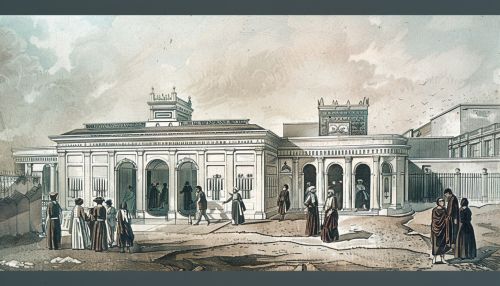Dean Mahomet
Early Life and Background
Sake Dean Mahomet, also known as Sheikh Din Muhammad, was born in 1759 in Patna, Bihar, India, during the Mughal Empire. He belonged to a family of Muslim nobility, his father being a part of the Mughal army. Mahomet's early life was marked by the cultural and political upheavals of the time, which played a significant role in shaping his future endeavors.
Military Career
At the age of 11, Dean Mahomet joined the East India Company army as a trainee under the mentorship of Captain Godfrey Evan Baker. He served in various capacities, including as a camp follower and a soldier, participating in several military campaigns. His experiences in the army provided him with a unique perspective on British colonialism and the socio-political dynamics of 18th-century India.
Migration to Ireland
In 1782, after leaving the East India Company army, Mahomet migrated to Cork, Ireland, with Captain Baker. This move marked a significant transition in his life, as he began to integrate into European society. In Ireland, he converted to Christianity and married Jane Daly, an Irish woman, in 1786. This union was notable for its cross-cultural nature, reflecting Mahomet's ability to navigate and adapt to different cultural environments.
Literary Contributions
Dean Mahomet is best known for his literary work, "The Travels of Dean Mahomet," published in 1794. This book is considered one of the earliest examples of Indian English literature and provides a detailed account of his life in India and his experiences in the British army. The work is notable for its vivid descriptions and insightful observations, offering a unique perspective on colonial India and its interactions with the British.
Establishment of the Hindoostanee Coffee House
In 1810, Mahomet moved to London and established the Hindoostanee Coffee House, the first Indian restaurant in Britain. The restaurant offered authentic Indian cuisine and became a popular spot for British patrons interested in experiencing Indian culture. Despite its initial success, the restaurant faced financial difficulties and eventually closed. Nevertheless, it marked a significant milestone in the cultural exchange between India and Britain.
Introduction of Shampooing
Dean Mahomet is also credited with introducing the practice of "shampooing" to Britain. In 1814, he opened the "Mahomed's Baths" in Brighton, offering therapeutic massage and steam baths. His treatments, which combined traditional Indian massage techniques with steam baths, gained widespread popularity and attracted high-profile clients, including King George IV. Mahomet's contributions to the field of health and wellness were significant, and he is often referred to as the "father of shampooing" in Britain.


Later Life and Legacy
Dean Mahomet continued to run his bathhouse in Brighton until his retirement. He passed away in 1851, leaving behind a legacy of cultural exchange and innovation. His life and work have been the subject of scholarly research, highlighting his contributions to literature, cuisine, and health practices. Mahomet's story is a testament to the rich cultural interactions between India and Britain during the colonial period.
